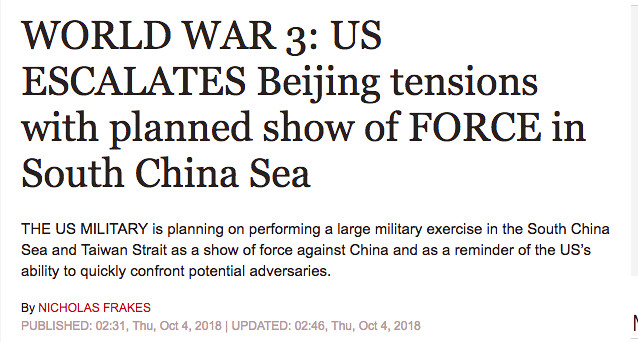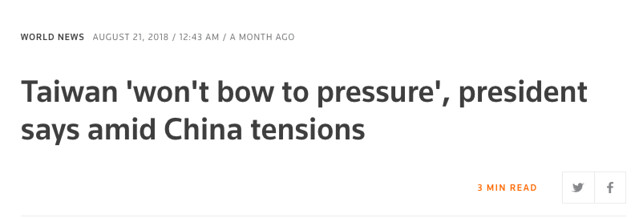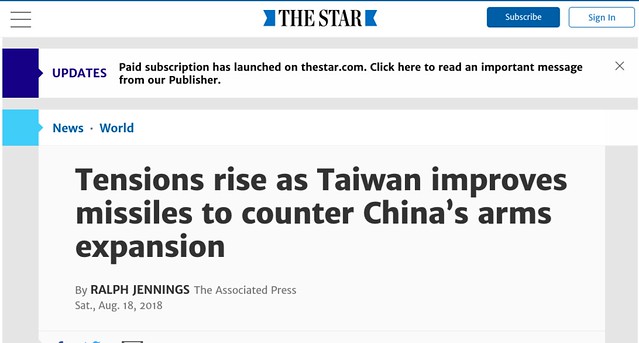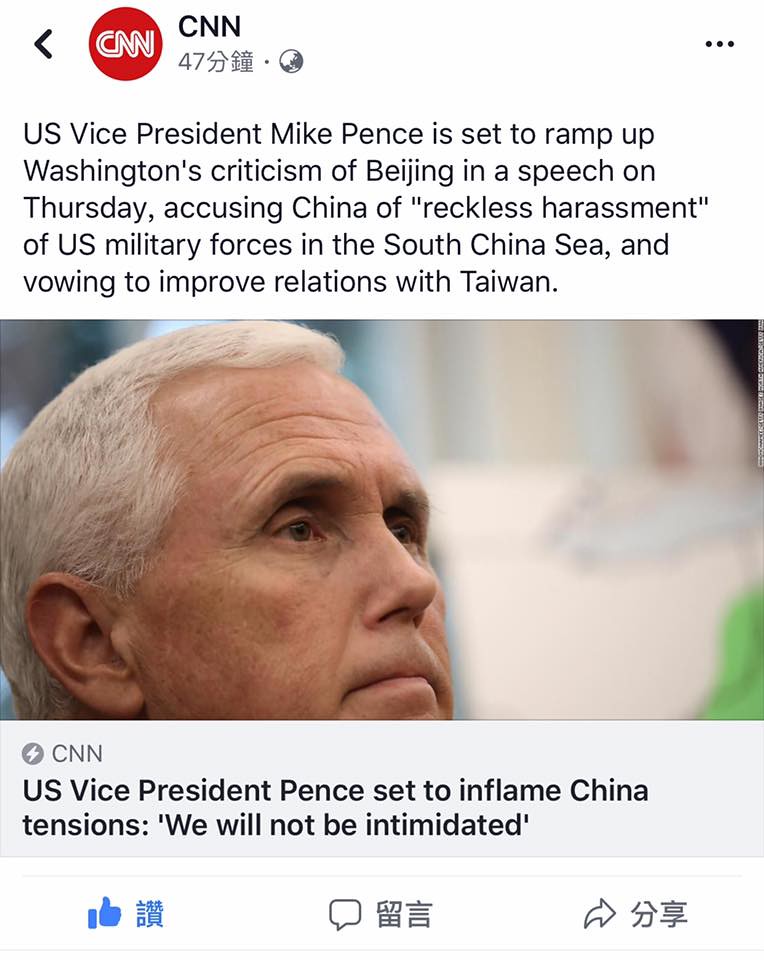Over the past few months, I've been keeping quiet track of something that's been a problem for awhile, because it's important to always keep a fire burning under the bum of anyone who reports on Taiwan.
Perhaps, with Michael Turton no longer blogging, someone's gotta do it. Perhaps I'm just fed up. I don't know. But in any case, it's once again time to look at the English-language media on Taiwan and their completely mangled ways of referencing "tensions" (OMG!) in the Taiwan Strait.
Let's get one thing out of the way - the tensions, such as they are, are always there. China wants you to think they're going up and down, but in fact when looking at it from Taiwan, nothing has really changed. My life is the same as it was on Election Day 2016. China attempts to chip away at Taiwan in little ways, but the "tensions" don't really change much beyond that.
But if you keep writing that they are "on the rise" or that "relations" keep hitting new "lows", people will think there's a real change. There isn't.
Notice the above - China is the one being aggressively expansionist in the South China Sea. China is the one that regularly threatens Taiwan with eventual annexation, actively tries to interfere in Taiwanese affairs, and attempts to diminish Taiwan's exposure and standing on the international stage.
Yet who is "inflaming" tensions? Not China - the US! For standing up to them! China can bully its neighbors in the region all it wants - if you dare stand up to that bully, you are the one "inflaming".

I mean, this is in Express so don't take it too seriously, but not only does the US "inflame" tensions, it "escalates" them. At least it's not Taiwan creating "tensions" anymore, it's the US. Is that an improvement? I don't think so: it plays right into a lot of anti-West liberals' beliefs that everything Western is evil and everything Asian is great, and that evil empires can only come from the West. Therefore, if the power is non-Western, it must be better or more moral.
This is absolute bollocks of course, but a lot of people believe it, and headlines like this don't help.
ALSO DON'T FORGET THE COMPLETELY GRATUITOUS AND UNPROFESSIONAL CAPITALIZATION.

I call this the "Classic" - in this construction, tensions just appear. Nobody causes them. Nobody is the aggressor (or at least, the aggressor is definitely not China). It's left unclear, because to clarify it would be to say, clearly and accurately, that China is the one purposely causing "tensions", and encouraging those tensions to be reported in the press as either an issue that just is - and therefore could not possibly be solved by the CCP being slightly less churlish because these tensions sort of exist ambiently - or is somehow Taiwan's or someone else's fault. They do this in order to make Taiwan's every move difficult.
That's an accurate reading of China's strategy of "tensions", yet nobody seems to report it that way. Nobody assigns the proper agent.
Here are some more ambient "tensions" for you:

Oh great, Taiwan's biggest human boondoggle in journalism writing about tensions as though they rise independently, rather than someone (China) making them rise, and implying that the reason is Taiwan's actions of mere self-defense, rather than China's aggression (which necessitates that self-defense).
Tensions are like self-rising flour I guess. They just...rise.
If you think I'm being to harsh, read an excerpt below:

I'm not sure how to read that last sentence, but it sure comes across to me as an implication that Taiwan maintaining its ability to defend itself from a Chinese attack - because remember, Taiwan has no intention of attacking Taiwan, but China absolutely talks of its intent to attack Taiwan - is what is "raising the chances of an armed conflict".
Not, oh, say, the country that actually talks about how it plans to precipitate an armed conflict.
China can talk openly about its intent to start a war to annex Taiwan by force, and nobody will say it is "raising tensions", but when Taiwan tries to improve its ability to defend itself from that openly-admitted-to attack, it is "raising the chances of an armed conflict".
And finally, there's the one that makes me sad:

I'd really hoped for better from The Guardian. I've written about this before, so won't belabor the point, but it's worth briefly repeating that this toes a line that, on either side, is not fair. Either it can be read as "relations reaching a low" with no agent pushing them to that low (although there is an agent: China), or it can be read as Tsai and her party (which "advocates for independence") being the ones who are causing the relation to "reach a low".
The opposite is true: Tsai has done her best to be even-tempered and toe a peaceful line while not giving in to China's bullying (a wise policy maneuver that is often mischaracterized as her refusing to "make concessions" to China - as though the problem were her stance, not China's, and she should be the one to concede). Yet you won't reach that conclusion by reading this.
The headline of this one was a problem too, making it sound as though Taiwan's isolation had no agent causing it, when the truth is that China is the one working to isolate Taiwan.
That is the accurate way to report the situation - China as the principal agent, the bully, the tension-causer, the isolator - so how come nobody says so?
Anyway, let's end on a happier note:
This is from the Washington Post - good work. Finally, someone gets it right. Someone assigns the proper agent to the "feud", the "relations hitting a low", the "tensions" - someone finally points the finger right where it belongs: China.
It's a message that the West desperately needs to hear. Why couldn't CNN, The Star and The Guardian write like this? (Express gonna Express, whatever.)
The Washington Post getting it right notwithstanding, this feels like another season, another batch of "tensions" that nobody will admit China is causing.
I'll check back in around the New Year to see who is writing about these sentient, self-raising "tensions" that are always on the rise despite, in reality, their always being about the same.


No comments:
Post a Comment